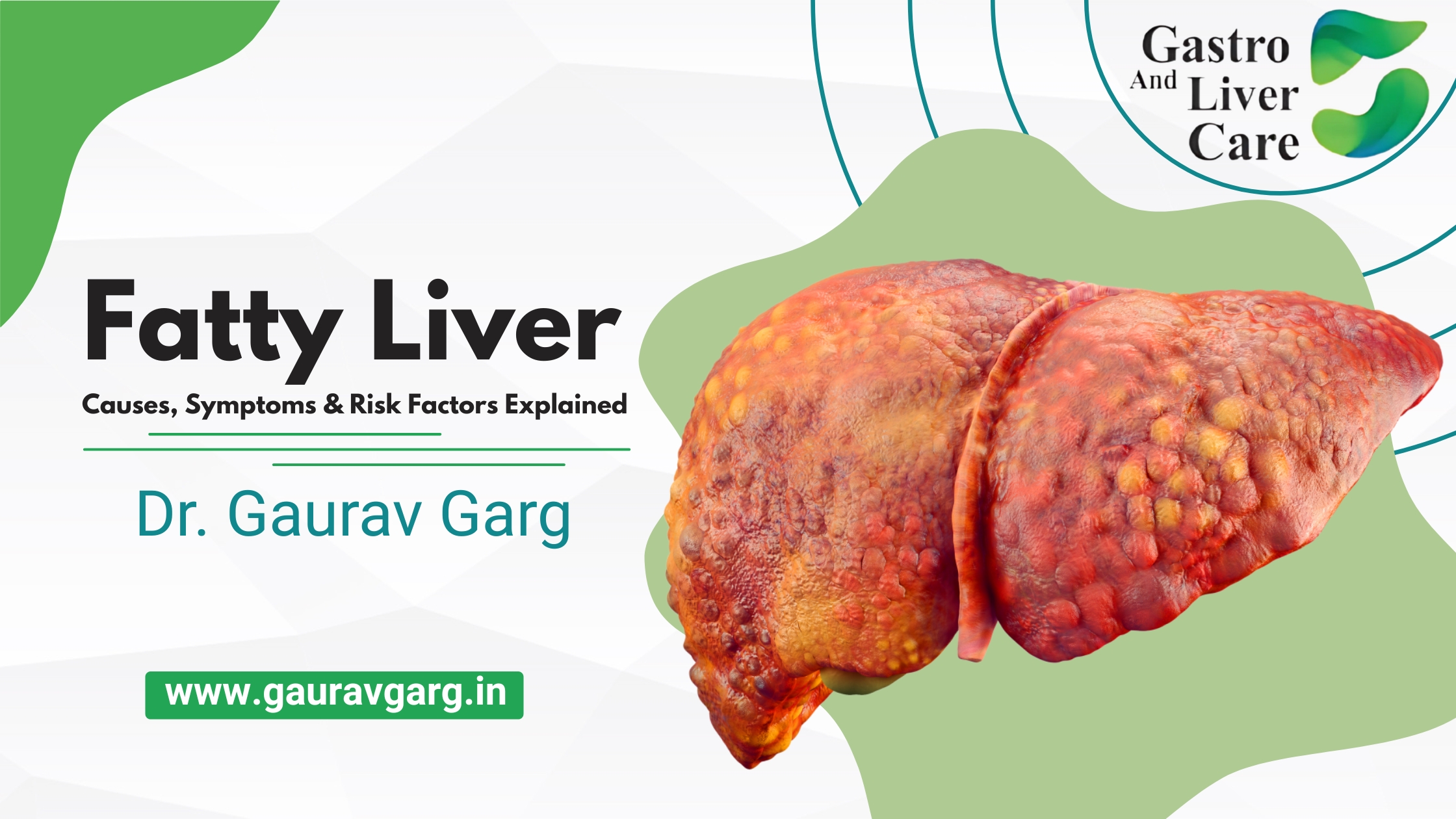18 Jun 2025
What Is Fatty Liver? Causes, Symptoms & Risk Factors Explained

Fatty liver is a common liver condition that occurs when excess fat builds up in the liver cells. While it is normal for the liver to have a small amount of fat, when fat makes up more than 5–10% of the liver’s weight, it becomes a health concern. This condition is often silent in the early stages but can lead to serious liver damage over time if left untreated.
Consult the Best Gastroenterologist in Meerut – Dr. Gaurav Garg for expert advice and treatment options related to fatty liver and other liver conditions.
What Is Fatty Liver?
Fatty liver, also known as hepatic steatosis, refers to the accumulation of fat in the liver. It is generally classified into two main types:
-
Non-Alcoholic Fatty Liver Disease (NAFLD): This type is not linked to alcohol consumption and is more common in people who are overweight, diabetic, or have high cholesterol.
-
Alcoholic Fatty Liver Disease (AFLD): This type is caused by heavy alcohol use, which damages liver cells and promotes fat buildup.
Fatty liver can develop silently, meaning most people may not realize they have it until it progresses to more serious stages.
Causes of Fatty Liver
Several factors contribute to the development of fatty liver. The most common causes include:
-
Obesity: Excess body fat is a major risk factor.
-
Diabetes: Especially type 2 diabetes increases the likelihood of developing fatty liver.
-
High Cholesterol or Triglycerides: These can lead to fat buildup in liver cells.
-
Poor Diet: Eating too many processed foods, sugary drinks, or fried items can overload the liver with fat.
-
Alcohol Consumption: Regular or heavy alcohol use can lead to alcoholic fatty liver.
-
Sedentary Lifestyle: Lack of exercise can worsen fat accumulation in the liver.
-
Rapid Weight Loss: Losing weight too quickly can cause fat to accumulate in the liver temporarily.
-
Genetics: Family history can also play a role in fatty liver development.
Symptoms of Fatty Liver
Fatty liver is often called a “silent disease” because it doesn’t cause noticeable symptoms in its early stages. However, as the condition progresses, symptoms may include:
-
Fatigue
-
Mild abdominal discomfort
-
Fullness in the upper right side of the belly
-
Unexplained weight loss
-
Weakness
In advanced cases, fatty liver can lead to inflammation (non-alcoholic steatohepatitis or NASH), liver scarring (fibrosis), and even liver failure or cirrhosis.
Risk Factors for Fatty Liver
Understanding who is at risk for fatty liver is crucial for prevention. Major risk factors include:
-
Being overweight or obese
-
Type 2 diabetes
-
High blood pressure
-
Metabolic syndrome
-
Polycystic ovary syndrome (PCOS)
-
Sleep apnea
-
High cholesterol or triglycerides
-
Age over 40
-
Smoking
The presence of multiple risk factors can accelerate liver damage, especially when paired with an unhealthy lifestyle.
How Is Fatty Liver Diagnosed?
Fatty liver is often discovered during routine health checkups. Common diagnostic methods include:
-
Blood Tests: To check liver enzyme levels.
-
Ultrasound: A non-invasive imaging technique to detect fat in the liver.
-
FibroScan: A special ultrasound to measure liver stiffness.
-
Liver Biopsy: In rare cases, a tissue sample is taken to determine the extent of damage.
Can Fatty Liver Be Reversed?
Yes, fatty liver can often be reversed, especially in the early stages, through lifestyle changes. Key steps include:
-
Losing weight gradually
-
Eating a balanced, low-fat diet
-
Exercising regularly
-
Controlling blood sugar and cholesterol
-
Avoiding alcohol
-
Taking medications if prescribed by a specialist
Early detection and treatment under the guidance of a gastroenterologist like Dr. Gaurav Garg can significantly improve liver health and prevent complications.
Conclusion
Fatty liver is a manageable condition if caught early. While it might not show symptoms initially, it can silently lead to serious liver problems. By understanding its causes, symptoms, and risk factors, you can take steps to protect your liver and overall health. Don’t wait until it's too late—talk to a liver specialist to assess your risk and get the right treatment.
FAQs:
-
What is fatty liver?
Fatty liver is a condition where fat builds up in liver cells, affecting its function over time. -
What are the early signs of fatty liver?
Fatty liver may cause fatigue, discomfort in the upper right abdomen, or no symptoms at all. -
Can fatty liver be cured?
Yes, in many cases, lifestyle changes can reverse fatty liver if detected early. -
Who is most at risk of fatty liver?
People who are overweight, diabetic, or have high cholesterol are at higher risk. -
Should I see a specialist for fatty liver?
Yes, consulting a gastroenterologist like Dr. Gaurav Garg is recommended for proper diagnosis and treatment.